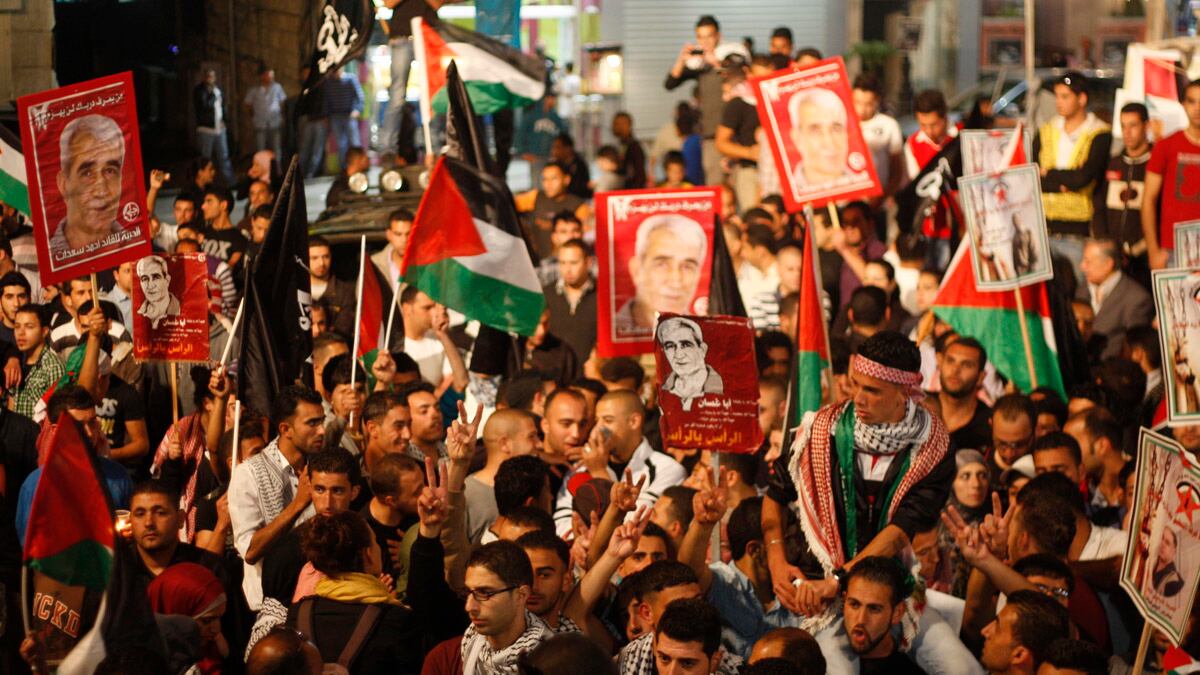Israel’s announcement that it will release 104 Palestinian prisoners in Israel jails for the killing of Israeli soldiers and civilians has predictably—and appropriately—prompted an intense argument over whether this was the right thing to do. On the “no” side are those who contend that freed terrorists return to terror; that allowing Palestinians to celebrate their “sacrifices” in return for simply negotiating is bad, even immoral, policy; that the public opposes such a deal; and that it proves Israel is susceptible to undue pressure. Those on the “yes” side argue that while it’s a difficult thing to do, it is necessary to start negotiations.
What the latter aren’t also saying is that freed terrorists don’t return to terrorism or the murder of Israeli citizens. That’s because they can’t: the evidence is mixed. While previous releases haven’t led to mass waves of attacks, there is some—enough—evidence that individuals do re-engage in violence.

On the one hand, certainly there are cases of individuals having been released from Israeli prisoners and then returning to terror. After the 2011 trade for Gilad Shalit, for example, the Shin Bet caught several individuals planning new terrorist attacks. On the release of these 104 Palestinians, Shin Bet head Yoram Cohen specifically said that “their release will damage security, both in terms of immediate threat to public safety and in terms of an erosion of deterrence.”
Yossi Melman notes that many of those freed in a 1985 trade became leaders of the First Intifada. In a 2008 report the right-learning Jerusalem Center for Public Affairs said: “According to an informal estimate by Israeli security bodies, about 50 percent of the terrorists freed for any reason whatsoever returned to the path of terror, either as perpetrator, planner, or accomplice. In the terror acts committed by these freed terrorists, hundreds of Israelis were murdered, and thousands were wounded.”
More specifically, Almagor, the Israeli Terror Victims Association—which opposes the release of prisoners—compiled a list detailing what it said were killings of Israelis by Palestinians released from prison between 2000 and 2005; there were scores.
But on the other hand, it seems that while some individuals do specifically engage in violence against Israelis after their release, there seems to be little evidence that freed prisoners have returned, en masse, to large-scale attacks. Moreover, when individuals have, it seems their ability to do so is directly connected to the opportunities and constraints provided by specific conditions in place at the time.
The First and, especially, the Second Intifada were rallying cries for individuals and groups trying to attack Israelis. But since then the Israeli security clampdown on the West Bank, the security barrier, the siege on Gaza, the Palestinian Authority’s own security measures, and broader stability in the West Bank seem to have removed both the incentive and the opportunity for a renewal of violence and terrorism. The stipulation that those most likely to engage in violence again be deported to Gaza or outside Israel/West Bank only reinforces the importance of this consideration.
In light of this, then, it’s easy to see why Netanyahu decided that releasing these prisoners was the best way to go in order to persuade Palestinians to return to talks. The security and political price was relatively small and easily absorbable. In his analysis Cohen continued that the release of these prisoners would also lead to “calm” in the West Bank, dampening dissatisfaction with the process and undermining the motivation for a broader uprising. The release is also to take place over stages, and can be stopped any time Israel decides the Palestinians are not meeting their own obligations. And there is probably a sense that many who might engage in terrorism will get caught by normal counter-terror operations anyway.
Israel already has a long history of letting prisoners go not only in return for captured soldiers or whose bodies have been held by Palestinian militants, but also as part of specific political agreements or processes, which provides a ready framework for policymaking. Of the current available options, a settlement freeze or a declaration of the 1967 lines as the basis for talks would, Bibi feared, undermine Israel’s position regarding settlements, serve as a commitment to withdrawing from virtually all of the West Bank, and allow the Palestinians to pocket these concessions without having given anything up at all.
So while Bibi still has considerable room to maneuver within the coalition, giving up so early on settlements and/or the 1967 lines would more quickly alienate members of his party and the government. It would force everyone to make a decision about staying in the coalition sooner rather than later—and that’s something everyone wanted to put off for as long as possible.
Shmuel Rosner put it best: “Netanyahu prefers to pay this emotionally high price rather than pay a price that has strategic meaning.” Combined with a lack of clear evidence of large-scale security consequences, a public interested in a final peace deal, and a coalition and Knesset on edge and full of people waiting to see what everyone else will do, Bibi’s demonstrated once again that he’s a tactically-smart politician. It remains to be seen how long he can maintain this delicate state of affairs.





